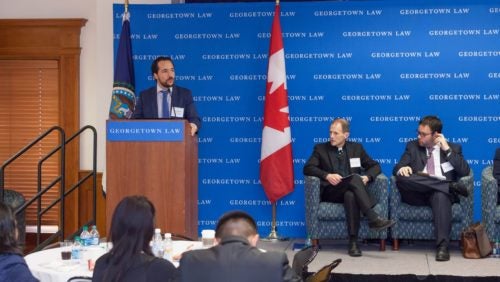NAFTA 2.0? Georgetown Law’s CAROLA Hosts “The Future of NAFTA”
October 12, 2017

Professor Alvaro Santos, faculty director of the Center for the Advancement of the Rule of Law in the Americas (CAROLA), introduced a panel at “The Future of NAFTA and North American Economic Integration” at Georgetown Law on October 6.
The economic model that has underpinned globalization in the last three decades, and the institutions that sustain it, are increasingly under attack in Europe and in the United States — as evidenced by Brexit and the 2016 presidential election. And then there are the recent attacks on NAFTA, the North American Free Trade Agreement that seeks to eliminate trade restrictions between the United States, Mexico, and Canada.
“We want to focus on NAFTA, because of its importance to the three member countries and to the North American region it has helped shape,” said Professor Alvaro Santos, faculty director of Georgetown Law’s Center for the Advancement of the Rule of Law in the Americas (CAROLA), as he introduced “The Future of NAFTA and North American Economic Integration.” The day-long conference was hosted by CAROLA on October 6. “But also because it is an important first test of how the challenges to international trade in the United States will be channeled…where NAFTA goes, so does trade.”
Three panels of experts addressed how NAFTA has worked for the countries involved, what issues ought to be part of the renegotiation and what countries can do domestically to buttress the benefits of the agreement and distribute the gains more widely. Georgetown Law Visiting Professor Jennifer Hillman, who once served on the World Trade Organization’s Appellate Body, led a panel exploring what a “NAFTA 2.0” might look like.
Karen Antebi, economic counselor of the Trade and NAFTA office at the Embassy of Mexico in Washington, D.C., said in a luncheon keynote that Mexico is committed to a “NAFTA 2.0”— a modernized agreement based on strong competition and inclusive trade, leveraging the 21st century economy and insuring certainty for investment in North America.
One Wall Street Journal opinion piece, she noted, predicts that quitting NAFTA would be an economic, political and national security disaster. Trade with Mexico and Canada supports 14 million American jobs and 600 billion U.S. manufactured goods each year — more than the next 10 largest markets combined.
“Withdrawing from NAFTA is not the solution…” Antebi said. “The undeniable reality is that our economies are profoundly intertwined.”
The Future of NAFTA
But opinions differed on the impacts of NAFTA as well as where to go from here. Mark Weisbrot, co-director of the Center for Economic and Policy Research (CEPR) asserted that “NAFTA has locked Mexico in a failed model of development and frozen the Mexican economy.”
“It has not benefited the majority of Mexicans,” Weisbrot said. “Mexico’s poverty rate is the same as 20 years ago.”
Professor Gerardo Esquivel of El Colegio de Mexico asked: “Who has benefited the most from NAFTA? Mexicans believe that the U.S. has benefited the most. The U.S. believes that Mexico has benefited the most. Canadians believe Mexico and U.S. have benefited most.
“NAFTA has not delivered on the promise of development to Mexico: no distribution of high value-added production,” he added. “This is not only because of NAFTA but also due to domestic issues in Mexico.”
The Canada Institute’s Laura Dawson said that Canadians are feeling forced out of the NAFTA relationship. “Negotiations have dissolved in two: modernization proposals and regressive proposals,” she said. “The latter is untenable for Canada and Mexico.”
Regarding domestic measures to bolster NAFTA, The Brookings Institution’s Dany Bahar said that “NAFTA countries need to do better work on domestic safety nets for who loses in trade.”
Mexican Senator Mario Delgado, who appeared on the final panel of the day, asserted that Mexican workers have increased productivity due to the trade agreement but that stagnant wages persist: “NAFTA needs to include a regional strategy of development to reduce the inequality gap in Mexico.”
The conference was co-sponsored by Georgetown Law’s Center for the Advancement of the Rule of Law in the Americas and Georgetown University’s Center for Latin American Studies, Latin America Leadership Program and Latin America Initiative.